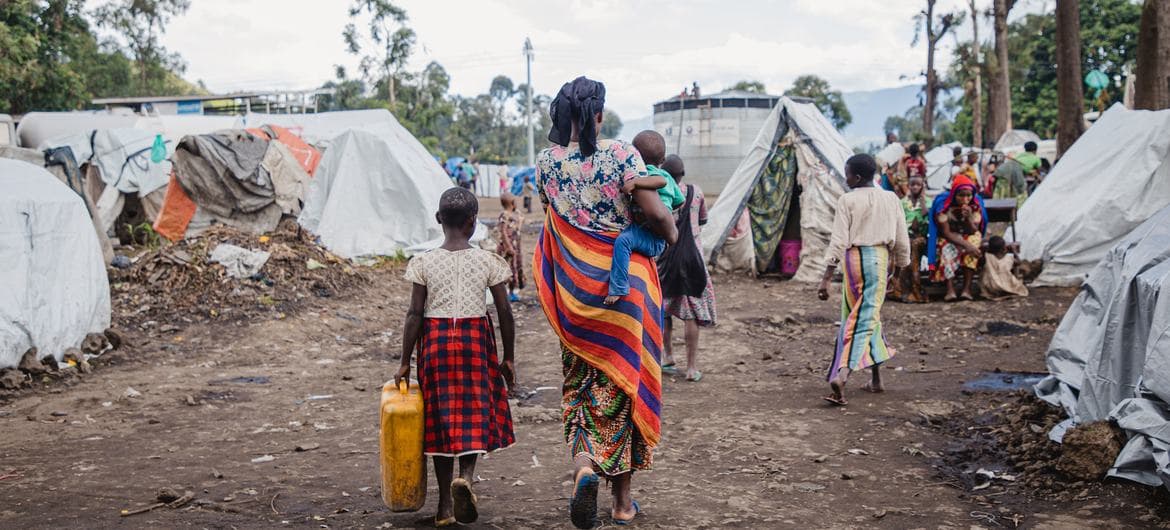YAOUNDÉ, Cameroon – A leading Christian charity has described the Democratic Republic of the Congo as “the rape capital of the world,” while also noting that because the DRC is an overwhelmingly Christian nation, most of the victims are also Christian.
Jeremy Frith, Head of Operations (USA) for Barnabas Aid USA, a Pennsylvania-based devoted to helping persecuted Christians around the world, told Crux that violence in eastern DRC has resulted in gross human rights violations, including the rape of women and girls, and the recruitment of children as child soldiers.
“DRC is said to be the ‘rape capital’ of the world due to continuous attacks,” Frith told Crux.
“There is hardly any part of the DRC that is not under pressure from the conflict, but regions of North Kivu and Beni, bordering Uganda and Rwanda, have suffered the most recently,” he said.
Frith’s comments come in the wake of an Oct. 22 report by Physicians for Human Rights which cites nearly 90,000 documented sexual assaults in 2023 in the DRC, up from 40,000 in 2021.
Representatives of the group say they interviewed local clinicians about rape victims, and the stories they were told are chilling: Children as young as 3 years old raped; victims sometimes held days or weeks in captivity; others penetrated with sharp objects.
The Director of Physicians for Human Rights, Saman Zia-Zarifi, described the level of sexual violence as “shocking” and “staggering.”
He suggested available statistics may actually pale in comparison to the actual figures. Many survivors, he said, particularly girls, are reluctant to make reports. Moreover, large numbers of survivors don’t have access to clinicians, and worst of all, an undetermined number of the victims are killed.
The Physicians for Human Rights report is buttressed by one published two weeks ago by Doctors without Borders, which said it had documented an “explosion of sexual violence,” and taken care of more than 25,000 sexual assault survivors last year compared to an average of 10,000 victims a year previously.
Frith told Crux that most of the victims are Christians, perhaps because the DRC is a largely Christian country: 95.8 percent of the population of 105 million people is Christian. According to the Vatican, there are more than 52 million Catholics in the DRC.
“Christians have suffered tremendously at the hands of the M23 rebels and many others,” Frith said.
On Oct. 3, some 18 Christians were killed in separate attacks in Ituri, north-eastern Democratic Republic of the Congo (DRC), with Islamic State Central Africa Province claiming responsibility.
Before the October killings of 18 people, over 45 people were killed on June 12, at Lala camp near Bule, in North Kivu.
“In the same area in January, 23 people were macheted to death in Makugwe village in Beni council. The killings are appalling, and we continue to wonder how the massacres in DRC have defied any solution for over 50 years now,” Frith said.
“Rape, murder, mass killings, destruction of churches, homes and farmlands and businesses; orphaned children used as sex slaves or child soldiers or forced to work in mines, and the list of atrocities goes on. This is what Christians face,” Frith told Crux.
“As unarmed civilians, they are victims of every atrocity in the region in the hands of different rebel groups, each with its own agenda,” he said.
The eastern DRC is home to at least 120 armed groups, some of them backed by neighboring countries such as Rwanda. Notable among them is the M23 and the Allied Democratic Forces (ADF) which continue to wreak havoc in eastern DRC. M23 is primarily an ethnic Tutsi rebel group with ties to the Rwandan and Ugandan governments, while ADF is an ISIS-affiliated militia group.
The fighting that dates back decades has killed millions and displaced millions more, with the United Nations reporting in March 2024 that at least 7.2 million people are now internally displaced in the DRC.
With escalating insecurity, charities such as Barnabas Aid are finding it increasingly difficult to work, Frith said.
“Barnabas Aid has not done as much as we would have wished to do because of these challenges,” he said, but there’s no question of giving up.
“Recently we have had to engage our partners in Uganda and through the Church, particularly the Anglican Church in Kasese, to help reach out to some communities in the north Kivu region. We are still developing the projects there and reaching out to rural communities. “
But Christians in the war-ravaged county have only one wish: Let there be a return to peace.
“The cry from the heart of people we have interacted with is for the killings to stop so that people can begin to rebuild their lives and communities and fashion a future for themselves,’ Frith said.
“Many know that they may never get justice, but they want at least to be allowed to live their lives without fear. They already are traumatized, and many have lost years without being able to go to school or continue their education, especially the youth who have lost decades of their lives to the conflicts. They desperately want peace. Whether the international community really even cares is a different thing.”
While they wait, Frith said Barnabas Aid is “working to provide their immediate needs, and, where possible, some economic empowerment schemes, [as well as] helping with farming, medication and schools where possible. We are still developing these with our partners. These have not taken off yet, but we do pray that we can begin to get results from early next year.”












